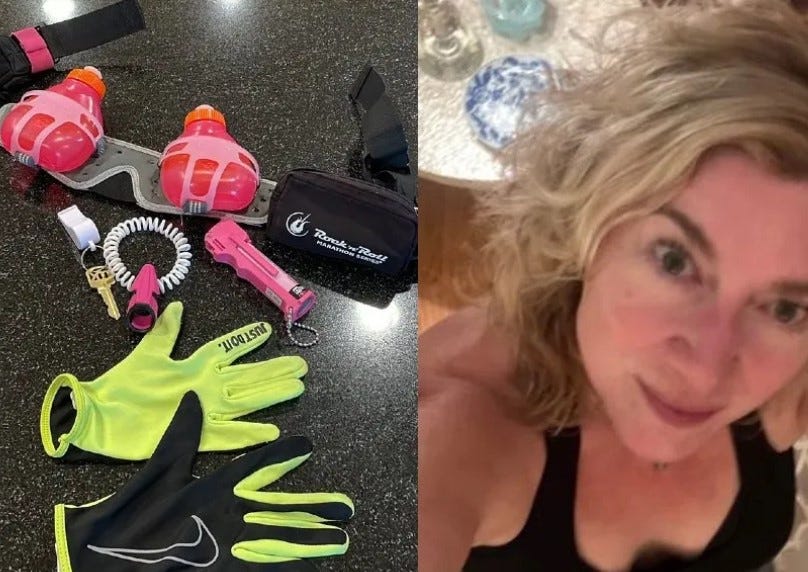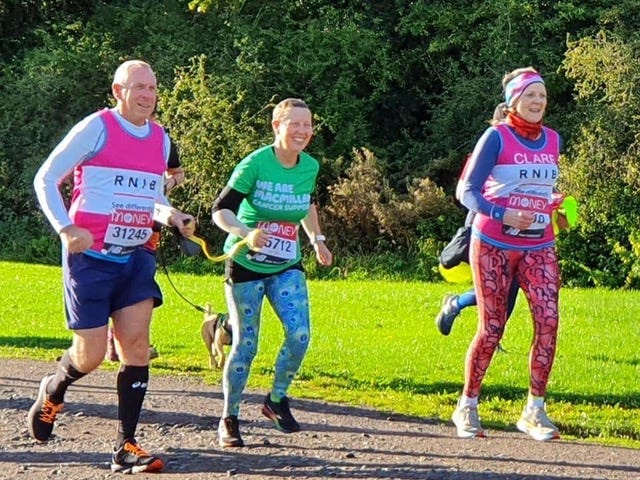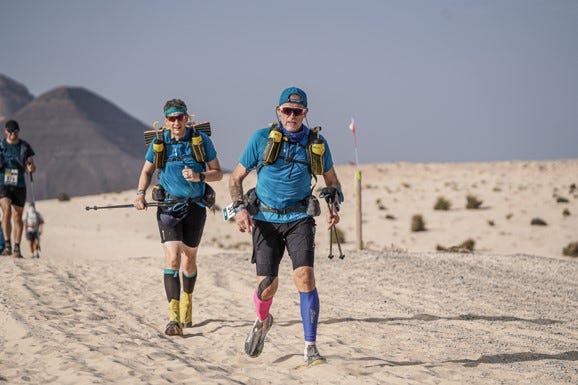Prostate cancer and heat stroke couldn't stop Nigel Watson finishing the 'toughest footrace on Earth'
The Marathon des Sables had always been a bucket list item, but cancer hadn't been part of his plan
It’s Monday. Sorry. Our Substack promise is to get these podcast inspired articles out on a Thursday. So… we’re late.
My excuse is I was running my first ultra on Sunday! If you can forgive us, please subscribe or consider upgrading your free subscription to a paid one.
Thank you 🙏❤️ 🙏❤️

Nigel Watson is 12km into day four of the Marathon des Sables, the 254km (156-mile) six day ultra marathon through the Sahara Desert.
And he’s in trouble.
It’s 56 degrees. He’s got 72kms to go. And he has heat stroke.
This is why the Marathon des Sables (MDS) is called “the toughest footrace on Earth”.
Nigel is slipping in and out of consciousness. His dream of completing the race in real danger.
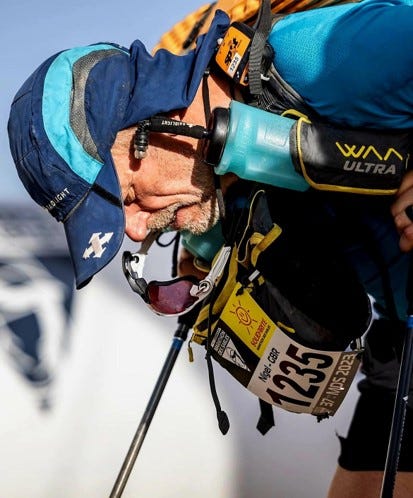

But the parkrun enthusiast, who runs at Redditch’s Arrow Valley event, is no stranger to adversity.
In fact, his MDS travails were far from the biggest he has faced in recent years.
That’s because in 2018 Nigel was diagnosed with prostate cancer.
A keen runner who had not only completed marathons, but also represented Great Britain at triathlon for his age group, Nigel was determined not to let his cancer beat him.
One of his first questions to his consultant was whether he would be able to continue running.
He said: “My running and my sports are really, really important to me. I've got a real positive attitude towards life.
“This was never, ever going to beat me. The big challenge was how would it affect me physically and the view of the consultant was if you can continue to run, healthy mind, healthy body, just keep doing so.
“When anybody gets that diagnosis, it comes as an immediate shock to you, but you go one or two directions.
“You either let it control you or you control it. That diagnosis almost charged the batteries further to make sure that I could get through MDS.”
How running can cure life’s problems:

His journey started with a coffee with another Arrow Valley parkrunner, Doug Richards, who had completed the MDS himself back in 1999.
Nigel had read Doug’s book, ‘Running Hot and Cold,’ which outlined his Marathon des Sables adventure, as well as runs in far-flung places such as China and Sri Lanka.
He told Running Tales: “It's always been a bucket list race for me, and, as many books as you read and as many videos as you watch, I don't think you ever get the real true story as to what it's going to be like unless you speak to someone that's done the race.
“Knowing Doug had done that back on the fourteenth edition in 1999, the obvious thing was to get in touch with him. That's where my journey started.”
That may have been when Nigel’s MDS journey began, but running has been a part of the 67-year-olds’ life since he was in his mid-20s.
A keen amateur footballer, he ran regularly to keep fit - even though he was a goalkeeper.
“I always gave myself this target of being as fit as the rest of the team,” he said. “In life I always look at challenges and think what can break me?
“That's where the marathons first started from and it just developed from there.
“Sometimes it's the solitude of running. I don't run with music. I don't train too often with friends. I go on long distance runs by myself.
“Whatever problems life's throwing at you, a run can cure them.”
The Ironman who couldn’t swim:

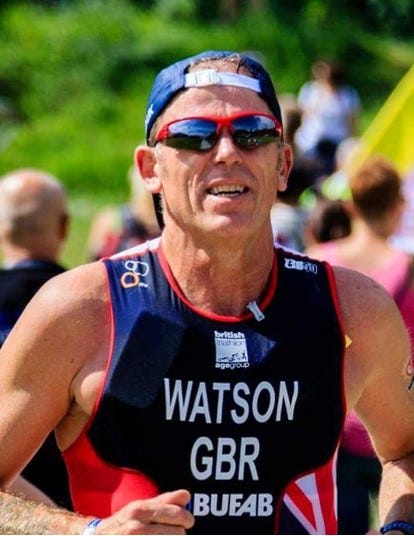
In 2012, he started competing in Ironman triathlon events, despite the fact he “couldn’t really swim”.
At the time, his longest swim was around 400 metres and he “hadn't been on a bike since my paper round as a child”.
But Nigel could run and he was willing to learn the other elements through sheer hard work. He spent hours at a local swimming baths and taking to the road on his bike.
Incredibly, just three years after he first took to the sport, Nigel was offered the opportunity to qualify for the GB team.
Also on Running Tales:
Even when he successfully did so, Nigel still hadn’t swam in the sea. Joining up with the squad for the first time in Majorca and walking into the water it was the “first time I'd gone out beyond waist depth”.
He said: “What didn't help was the sea was so warm. It was a non-wetsuit swim, and my wetsuit was my comfort blanket.
“If you wanted all the challenges thrown at you in one day, they were certainly stacking up.
“My wife was at the side and she looked at me and she said, ‘you're white, if you don't want to do it, just duck out’.
“But I think when you got GBR on your chest, it sort of puts your big boy pants on.”
He went on to represent Great Britain for six consecutive years, finishing as high as second in half-Ironman event in the UK and eighth in Europe.
“It was something I've been really, really proud of. I'm old school, old fashioned, and I think representing your country is big,” he said.
Nigel has now completed four full Ironman events - each consisting of a 2.4-mile (3.9 km) swim, a 112-mile (180.2 km) bicycle ride and a marathon 26.2-mile (42.2 km) run - and more than 30 half-distance races.
Running for Lizzie:
Despite his extreme sporting feats, Nigel’s running CV still lacked the addition of an ultra marathon.
It was only when he was inspired by yet another Arrow Valley parkrunner, Lizzie Tovey, that he ticked off the distance.
Despite having only recently taken up running when she started to struggle with her eyesight, visually impaired Lizzie had completed the 2019 London Marathon. But that was only the start of her health battles.
After being diagnosed with terminal cancer just a year later, Lizzie had decided to run the marathon again - this time as a virtual event, which she completed in three gruelling stages including a night run.
On the day of the London Marathon, a group of Lizzie’s supporters - including Nigel - decided to do a virtual run from Birmingham to Arrow Valley Park, where they would meet her to complete a final 10k.
“But with the amount of looping that we did that day, me and a couple of friends ended up running 35 miles,” he said
“We said to ourselves, actually, we've just done an ultra. That's where that bit of it started.”
Sadly, Lizzie lost her battle with Cancer on Boxing Day 2020. She is remembered at Arrow Valley Park by a bench positioned at an area she used to run passed that has been renamed ‘Tovey’s Corner’.
Nigel said: “She just touched everybody's hearts who she met.
“You’ll have probably noticed that I always run in one blue sock and one pink sock. The blue sock represents prostate cancer, the pink sock represents breast cancer. And that's for Lizzie.
“If anybody goes, ‘why the socks,’ it lets me say to people, if you're over 50 and you haven't had a PSA test (which measures the amount of prostate-specific antigen (PSA) in your blood, with high levels potentially indicating the presence of prostate cancer), please have one, because that's how they can find prostate cancer.
“And then the pink one, obviously, is just to make sure people are getting tested for breast cancer.”
Health body, healthy mind:
Nigel’s own diagnosis came “as a complete chance”.
After competing in Ironman Wales in 2018, he fell ill and was sent to have a blood test.
Just days later he was told he had prostate cancer.
He immediately decided it wasn’t going to stop him: “I think my family think I'm stupid at times for some of the stuff that I do.”
"Just live life to the full and love every minute of it"
“I was in floods of tears, as far as I was concerned it was a death sentence”. It’s May 2017 and Tony Collier had just been diagnosed with terminal prostate cancer. Just days earlier, Tony - approaching 60 but fitter than ever and with all six Marathon Majors recently behind him - had been training for the Comrades Ultra.
Nigel underwent surgery to have his prostate removed. Despite it being largely successful, the doctors were unable to cut out all of the cancerous material as it had spread.
“For the last three years, I've been having six monthly MRI scans,” he said.
“And finally this April, they found where it was. Fortunately, it hadn't metastasised, it hadn't gone to lymph nodes, and it was still local to the prostate area.
“So that was a real, real positive. At the moment, I'm 19 days into 33 days of radiotherapy.
“Touching wood, the consultant thinks that where it is and with the radiotherapy that I'm having, I should be able to get rid of it.
“I've got no other thought than we're going to get rid of this. Right from day one, I've been trying to show this who’s boss.
“It's not influenced my life. It hasn't changed my life. I still do what I want to do when I want to do it.”
‘I’ve never been in so much pain’
Which leads us back to the Marathon des Sables.
Even getting to the event proved challenging for Nigel as he picked up a serious injury just months beforehand.
Running in the 45-mile The Lap ultra at Lake Windermere, he fell and landed awkwardly.
Nigel finished the race and even followed it up with a marathon before taking on a 100-mile ultra in the autumn of 2022. But 75-miles into that race, he began to struggle.
“I'd never been in so much pain in all my life,” he said.
He finished the race but a visit to a consultant revealed he had a two inch split in his femur.
With the Marathon des Sables due to take place in April 2023, time was at a premium.
Luckily, he didn’t require surgery and instead “they overdosed me on calcium for about two months.
“I was told no running and no cycling. All I could do was swim. I was doing three 5k swims a week in the pool.
“I started running again on January 2 and there was still real concern that I wouldn't be ready for the Marathon des Sables in April.”
A period of intense training followed and Nigel was ready: “There was no way anything was going to stop me getting there.”
‘The longest day of my life…’
And so we are back in the depths of the Moroccan desert, an exhausted Nigel struggling to find the energy to move.
His first three days in the desert had gone well, with marathon distances covered in around six hours despite the searing heat.
But now it looks like his race might be over.
“I sat down against a wall and spent the next 45 minutes in and out of consciousness,” he told Running Tales.
“I was suffering from heat stroke, but luckily for me the medics were so busy with so many other people, they didn't get to me for quite a while and I'd started to come round.”
Nigel was allowed to continue and incredibly found something deep within himself that allowed him to complete the day in 23 hours and 45 minutes.
“I can honestly say it was the longest day of my life, but the most fulfilling one,” he said.
“Because we started in the morning, we ran through the day, we watched the sun go down. We went through the pitch black of the night, we watched the sun come up in the morning and finished. It was just an absolutely amazing experience.
“There were three things that kept me going. Firstly, at my lowest point in the race, when I was considering if I could carry on, I switched my phone on.
“I've just had two grandchildren, twins, and they came up on the screen and I just thought, who wants a granddad who is a failure.
“It does give you a real shot in the arm. And then overnight in camp, you get messages that people who are back home are sending through to you.
“I had so many messages saying so many things that I didn't think were deserved. I just think how can you let them down and how can you go back and say, I'm sorry, I didn't finish.
“And I suppose the third bit is there's just something in me that I never give up. If you've got that inner drive, it's just something that keeps you going.”
The man who dared to dream, who fought cancer and never gave in. Who couldn’t move and could barely stay awake as a scorching sun beat down on him, had done it.
“It was the hardest thing I’ve ever done, both physically and mentally.
“It took me to the limit. I'm really, really proud to have finished it.
“MDS stretches your boundaries. It takes you beyond things you think you're capable of, both mentally and physically. And I think you come back with a different respect for yourself.”
Thanks for reading and listening to Running Tales. We couldn’t do this without your support - please back us to keep going by…




